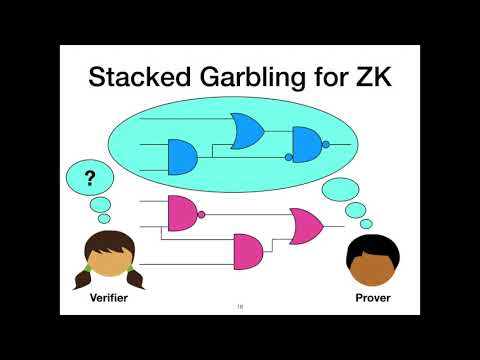CryptoDB
Stacked Garbling for Disjunctive Zero-Knowledge Proofs
| Authors: |
- David Heath , Georgia Institute of Technology
- Vladimir Kolesnikov , Georgia Institute of Technology
|
| Download: |
- DOI: 10.1007/978-3-030-45727-3_19
(login may be required)
- Search ePrint
- Search Google
|
|
Conference:
|
EUROCRYPT 2020
|
| Abstract: |
Zero-knowledge (ZK) proofs (ZKP) have received wide attention, focusing on non-interactivity, short proof size, and fast verification time. We focus on the fastest total proof time, in particular for large Boolean circuits. Under this metric, Garbled Circuit (GC)-based ZKP (Jawurek et al., [JKO], CCS 2013) remained the state-of-the-art technique due to the low-constant linear scaling of computing the garbling.
We improve GC-ZKP for proof statements with conditional clauses. Our communication is proportional to the longest branch rather than to the entire proof statement. This is most useful when the number m of branches is large, resulting in up to factor m× improvement over JKO.
In our proof-of-concept illustrative application, prover P demonstrates knowledge of a bug in a codebase consisting of any number of snippets of actual C code. Our computation cost is linear in the size of the code- base and communication is constant in the number of snippets. That is, we require only enough communication for a single largest snippet!
Our conceptual contribution is stacked garbling for ZK, a privacy-free circuit garbling scheme that can be used with the JKO GC-ZKP protocol to construct more efficient ZKP. Given a Boolean circuit C and computational security parameter k, our garbling is L · k bits long, where L is the length of the longest execution path in C. All prior concretely efficient garbling schemes produce garblings of size |C| · k. The computational cost of our scheme is not increased over prior state-of-the-art.
We implement our GC-ZKP and demonstrate significantly improved (m× over JKO) ZK performance for functions with branching factor m. Compared with recent ZKP (STARK, Libra, KKW, Ligero, Aurora, Bulletproofs), our scheme offers much better proof times for larger circuits (35-1000× or more, depending on circuit size and compared scheme). For our illustrative application, we consider four C code snippets, each of about 30-50 LOC; one snippet allows an invalid memory dereference. The entire proof takes 0.15 seconds and communication is 1.5 MB. |
Video from EUROCRYPT 2020
BibTeX
@inproceedings{eurocrypt-2020-30209,
title={Stacked Garbling for Disjunctive Zero-Knowledge Proofs},
booktitle={39th Annual International Conference on the Theory and Applications of Cryptographic Techniques, Zagreb, Croatia, May 10–14, 2020, Proceedings},
series={Lecture Notes in Computer Science},
publisher={Springer},
keywords={Garbled circuits;inactive branch elimination;ZK;proof of C bug},
volume={12105},
doi={10.1007/978-3-030-45727-3_19},
author={David Heath and Vladimir Kolesnikov},
year=2020
}

